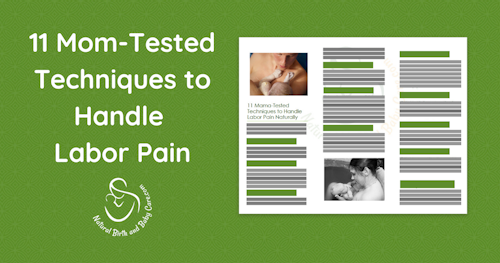
Worried about what you do if your birth plan needs to change? Many women have the same worry.
Mamas ask me, “I’m planning a natural birth, but what do I do if something comes up?
Does that mean it’s going to go all out the window?
And sometimes moms are resistant to preparing for a natural birth or having a birth plan because they worry it won’t matter if something unexpected happens.
But the truth is, is that it can matter.
It does matter.
Birth can bring the unexpected.
I’ve had eight babies – and I’ve worked with thousands of women for over 18 years.
I have seen a lot and know that birth can be unexpected.
In fact, I’ve assisted with over two dozen births.
So it’s important to acknowledge that birth can sometimes bring the unexpected.
But you can do so much to prepare for a natural birth, both preparing so that it goes exactly like you dream about in your birth plan and how to handle it if things aren’t going quite the way you want them to.
(NOTE: Want a Perfect Birth Plan Template? Use this template and step-by-step videos to write a birth plan that gets your birth team on your side for a beautiful birth experience! Get the birth plan kit here.)
What to do First When the Unexpected Happens
The first thing to do is if something seems to be coming up that isn’t going according to your birth plan is to ask questions.
Sometimes a care provider might say, “OK, well, I think this is going on, so this calls for a change in your birth plan.”
Sometimes your response should be, “OK, can you tell me the pros and cons?”
The next question to ask is, “What happens if we wait?
A lot of times there are pros and cons and your care provider is used to talking about those, but they don’t necessarily talk to you about waiting. In the obstetric world, the technical term for that would be would be expectant management. That’s where you watch and wait and for the most part that’s safe to do.
There are also some things that we know that can create distress. For example, continuous fetal monitoring. If something comes up on the fetal monitor, everybody is distressed.
Reality and research say that those alarms don’t ensure good outcomes (usually it’s a false alarm).
But something you can do something to help. In the continuous fetal monitoring example, you can change positions and see how baby responds to that.
Often there are things that you can do before you rush off into an emergency. Sometimes that’s as simple as waiting.
Waiting and seeing is a valuable thing to do, and often it’s just as safe as moving into an intervention or perhaps even safer.
So ask, “what happens if we wait?”
Ask those questions, even if you need to ask questions quickly. There are very few legitimate emergencies that require you to jump into action right away.
Most of the things allow a wait.
Oftentimes even when they decide, “OK, we need to do a cesarean,” they’ll still take 30 minutes to get everything prepped.
That wasn’t an emergency cesarean.
An emergency cesarean is where they have to get you on the table right away. There are some situations that require that, but not most.
Instead, you can try something new like getting up and changing positions and moving around and that sort of thing.
(NOTE:Want Labor Pain Techniques that REALLY Work? Get these 11 mom-tested techniques for handling contractions from start to finish Get the mom-tested natural labor techniques here.)
What Else to Try
Changing positions is the next thing to do when things aren’t going as planned.
This is helpful for situations like the dreaded failure to progress, when labor just isn’t moving along the way that you want it to.
Sometimes a change of positions can really help.
Sometimes getting some rest can really help.
Think outside of the box and ask “what can we do or what haven’t we tried?”
Sometimes moms in labor are exhausted and hungry, and having something with quick energy can really help you.
One of my midwifery professors, Gloria Lemay, talked about going down the hall to the soft drink machine and buy the mom a soda so she gets some quick energy and see what happens.
She was talking about an instance where a mom was out of energy to push her baby out and they gave her some sugar and she found some energy!
You wouldn’t expect a marathon runner to get by with nothing. They’re running and running and running and they have stations where they have nutrients and gel formulas waiting for them.
I’m not a runner, so I don’t know all the details, but I know they have those things for them to be able to get that quick nutrition, that quick carbohydrate, that quick glucose into their bodies.
And you need energy and nutrients in labor, just like the runner does during her marathon.
So think outside the box.
Would a position change help?
Sometimes baby isn’t moving down because baby isn’t in an ideal position.
A position change can help get baby into an ideal position. Or it can get your baby backed off the cervix to reposition slightly.
A chest-to-the-ground position, where you’re on your hands and knees and you put your chest down, that’s an example that helps baby “back off” the cervix.
Even a side-lying position on your left side can help bring baby off the cervix a little bit. It also allows you to rest comfortably and gives your baby maximum blood flow.
Then you can get up and try and get baby more optimally positioned.
Mexican midwives have pioneered using the Rebozo Shaw, which can help do the same thing.
Birth balls can help move babies down.
In other words, if something unexpected comes up, like labor isn’t progressing or you’re feeling tired or out of energy, just tapped out, sometimes simple solutions can help get your birth plan back on track.
And remember, even if it’s brief, calm discussion can help.
Suppose it turns out that there is an emergency where you need to change your birth plan. In that case, you’ll feel more confident if you have calm conversations and collaboration with your care provider. This is true even if it’s very briefly because of the nature of the situation.
You will feel much better.
At the end, there may be some grief because of what you lost, but you will also feel that sense of collaborative care, that respect, and that dignity from having worked together with your care provider and made a collaborative decision rather than feeling like that powers been taken away from you.
Those are some tips to work with when you feel like your birth plan may be going off track or things aren’t going quite right.
- First ask: What can we do to get it back on track?
- Then, if needed ask, “what can we do to feel that respect, dignity, and collaboration to help accept it when we know something needs to change?
You may also enjoy this podcast episode: When Labor Throws the Unexpected
Looking for a natural childbirth course that’s evidence-based AND focused on honoring your intution and power during your birthing time?
Click here for details on MamaBaby Birthing, my complete online birthing course. Used by thousands of birthing families, you’ll be completely prepared for a beautiful, safe, and confident birth experience.








